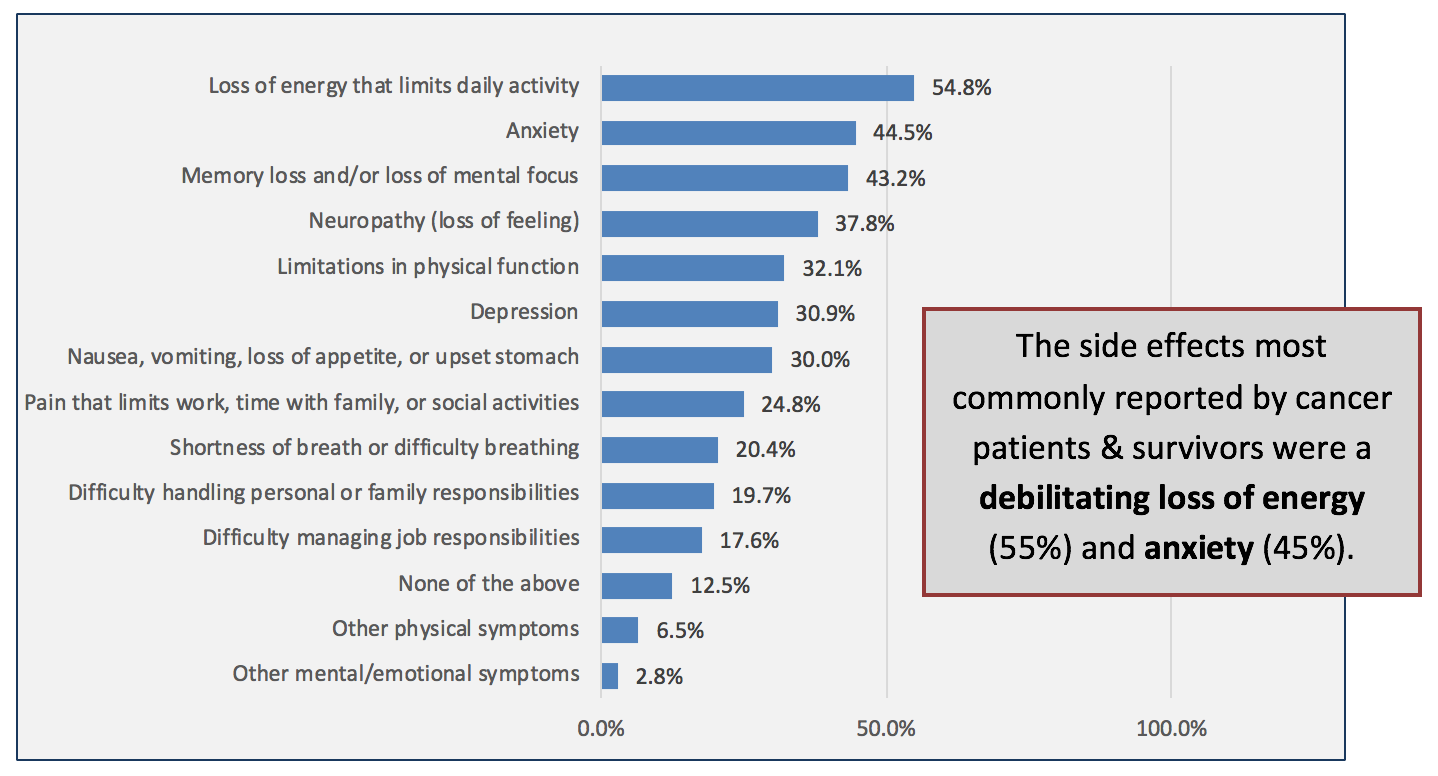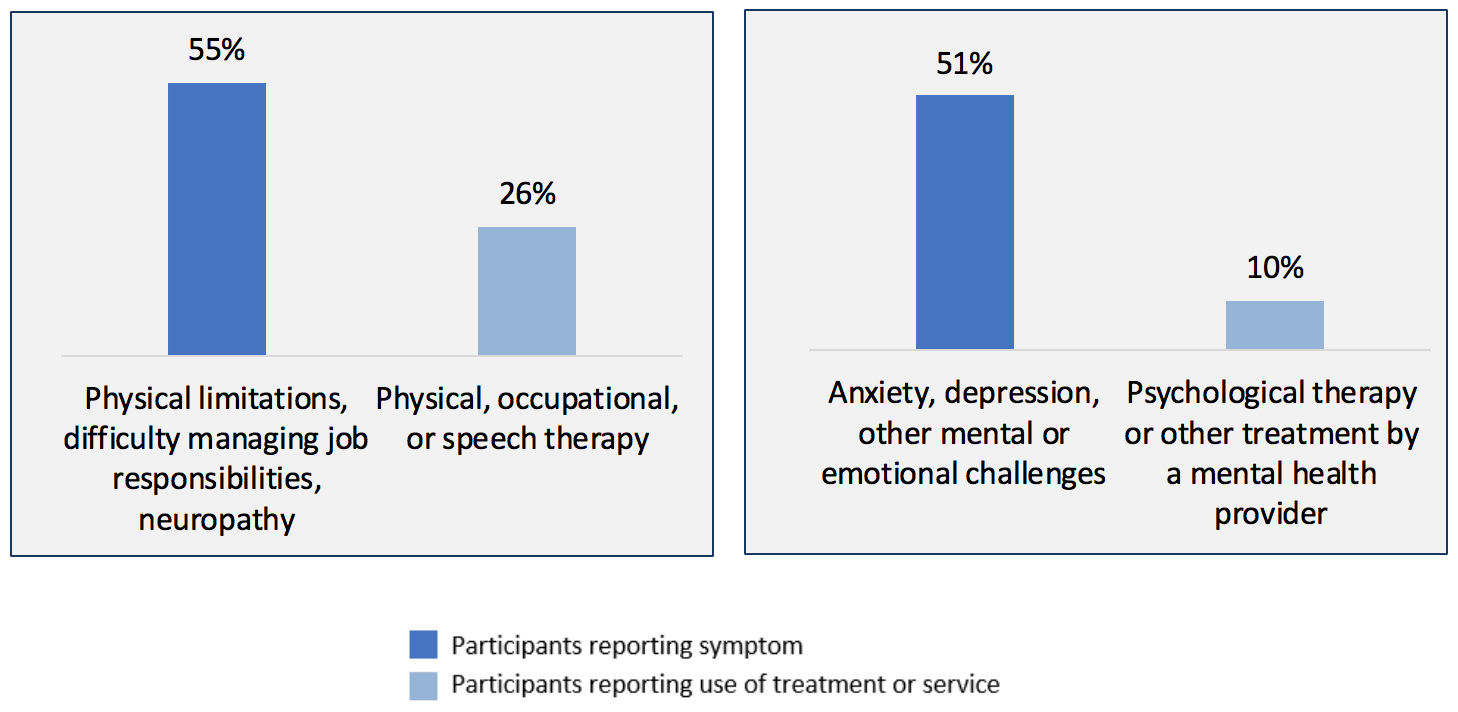| Palliative care is specialized medical care for patients with serious illness – including cancer – that focuses on preventing, relieving and addressing symptoms and side effects; and supporting the best possible quality of life for patients. |
In August-September 2019, the American Cancer Society Cancer Action Network (ACS CAN) — through its Survivor Views Project1 — conducted a survey of cancer patients and survivors to determine whether they were asking for and getting appropriate palliative care treatment.
The survey found that while the overwhelming majority of cancer patients who experienced symptoms from their treatment discussed the issues with their physician, only a small fraction of those patients were referred for palliative care.
Survivor Views: Symptoms Experienced Related to Cancer

|
60% of respondents said their symptoms or side effects lasted after their active treatment was completed.
|
Few Cancer Patients are Receiving Needed Palliative Care
The survey indicated that few cancer patients were referred to and received treatment for symptoms – pointing to unmet palliative care needs.
- 92% of cancer patients reported discussing non-pain symptoms at least briefly with a provider
- 82% of cancer patients reported discussing cancer pain at least briefly with a provider
- 64% of cancer patients said their provider suggested treatment for their non-pain symptoms
- Only 6% of cancer patients reported having been referred specifically to palliative care or a quality of life specialist2
Survivor Views: Differences in Treatment Rates for Certain Common Cancer Symptoms

Myths About Palliative Care Persist
One potential reason for unmet palliative care needs is that some cancer patients still do not fully understand what palliative care is, or how and when it can help them. Significant numbers of surveyed cancer patients and survivors believed these common myths about palliative care:
- 33% believed palliative care is intended only for end of life care, or only for patients who will never be cured
- 17% believed palliative care is intended only to deal with symptoms directly related to their cancer
- 9% believed that receiving palliative care meant their doctor had given up on their curative treatment
|
A Survivor’s View
“I was diagnosed at the age of 20, and finished treatment before I turned 21. I was a healthy and active soldier when I was diagnosed. I have struggled with chronic pain and breathing issues since I was 20 and then issues with my thyroid, hormones and fatigue, directly related to cancer treatment. I went years just trying to get through the day, raising 2 kids with no energy but trying to give them a childhood of fun memories instead of memories of a “sick” mom. Not only was my health taken from me but so was a career in the army and the psychological and emotional effects of having no family around, or anyone my age understanding what I was living with. Palliative care then would have helped me understand what to expect, how to explore other options to help with pain and side effects and to have a support group. Palliative care is so much more than just “end of life” care. The entire family can benefit as well and for the patient to know there’s non opiate options to help effectively manage pain.”
--Lymphoma Survivor from Arizona
|
ACS CAN Position
ACS CAN works to increase patient access to palliative care through federal and state policy change, including:
- Growing the palliative care workforce through creating more career opportunities for providers who want to enter the specialty, training more healthcare professionals in basic palliative care principles and skills, and educating primary care-focused providers on when and how to refer to palliative care
- Creating more public awareness around what palliative care is, how it can help patients, and how patients can access it
- Focusing research on improving care, treatment, and quality of life for patients with serious illness
- Improving public and private insurance coverage of palliative care
At the federal level, ACS CAN strongly supports the Palliative Care and Hospice Education and Training Act, which will increase education, awareness and research regarding palliative care.3
Unless otherwise cited, data presented in this factsheet are from ACS CAN Survivor Views Pain and Palliative Care Survey, fielded August 20-September 19, 2019. See https://www.fightcancer.org/policy-resources/survivor-views-pain-and-pal... for more information.
1 For more information about Survivor Views, please visit https://www.fightcancer.org/survivor-views
2 Note that some of these patients may have been receiving palliative care through their oncologist or some other means that did not involve a specific palliative care referral.
3 H.R. 647/S. 2080

